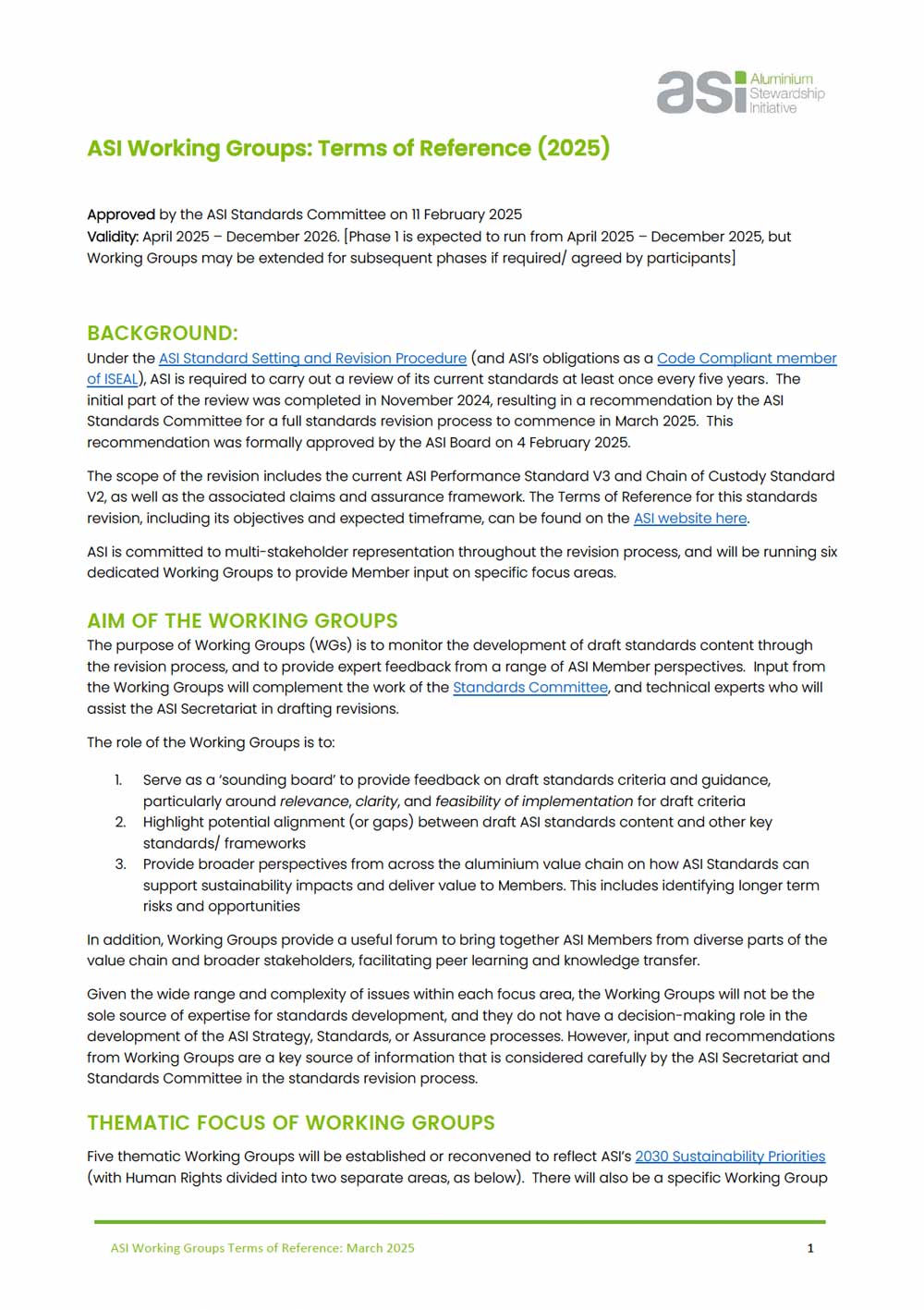ASI Working Groups
ASI Working Groups enable participation from all membership classes as well as broader stakeholders and experts to input to the Standards.
What are ASI Working Groups?
The purpose of Working Groups is to monitor the development of draft standards content through the revision process, and to provide expert feedback from a range of ASI Member perspectives. Input from the Working Groups will complement the work of the Standards Committee, and technical experts who will assist the ASI Secretariat in drafting revisions.
The role of the Working Groups is to:
- Serve as a ‘sounding board’ to provide feedback on draft standards criteria and guidance, particularly around relevance, clarity, and feasibility of implementation for draft criteria.
- Highlight potential alignment (or gaps) between draft ASI standards content and other key standards/ frameworks
- Provide broader perspectives from across the aluminium value chain on how ASI Standards can support sustainability impacts and deliver value to Members. This includes identifying longer term risks and opportunities
Working Groups are composed primarily of representatives from ASI Member organisations. However, non-Members can be included in Working Groups based on relevant expertise and capacity of the groups.
 2025 Working Groups
2025 Working Groups
As part of the 2025-27 Standards Revision, six thematic Working Groups will be established (or reconvened). Sample of key topics to be covered:
1 Climate Change
- Refining climate-related criteria and Guidance for the PS V4
- Exploring abatement, compensation and adaptation for a 1.5C aligned sector
- Exploring carbon related claims and data exchange
- Defining implementable monitoring, reporting and verification processes
2 Circularity
- Resource efficiency, including eco-design/design for circularity, value retention, environmental footprints, pre-consumer scrap reduction
- Circularity performance, waste elimination and resource valorisation
- Extended Producer Responsibility (EPR) and inclusivity in circular practices
3 Nature
- Assessing nature-related dependencies, impacts, risks and opportunities across biodiversity/ ecosystem services, soil, water, land use, pollution, and related topics
- Managing material impacts on biodiversity/ ecosystem services, soil, water, land use, pollution and related topics, including incorporating leading practices and outcome based criteria, where relevant
- Alignment with key nature-related approaches, frameworks and metrics
4 Community Rights and Participation
- Grievance mechanisms
- Rights of Indigenous Peoples and other land-connected communities
- Free, Prior, and Informed Consent
- Other social and environmental impacts on communities- including livelihoods and ecosystem services
- Impacts of mine closure and rehabilitation
- Area of influence and associated facilities
5 Labour Rights/ Health and Safety
- ILO fundamental principles and rights at work, including working hours and overtime
- Diversity and inclusion (including gender)
- Health & Safety Management Systems (including alignment with ISO 45001)
- Aluminium- specific health and safety risks
6 Chain of Custody/ Claims
- Objectives and future role of mass balance CoC/ other CoC models
- Product related claims (carbon footprinting etc)
- Chain of custody/ accounting systems and other objective evidence required to substantiate such claims
- Supply chain mapping/ transparency expectations/ support for due diligence
Cross-cutting themes
Some topic areas will be relevant for more than one Working Group. These include for example: mine closure and rehabilitation (which are relevant for the Human Rights and Community Impacts, Nature and Circularity), community rights and protections or ecosystem services
Each Working Group will focus on topic-specific (and some crosscutting) issues and ASI’s role in enabling and accelerating global transformation of the aluminium sector. Working Groups on occasion will overlap to feed into crosscutting themes, consistent with the ASI Strategy. More information on the focus areas for each Working Group can be found in the Terms of Reference.
The Working Groups are set to run from April– December 2025 (with possible extension in some cases).
Who can Participate?
Any ASI Members (except sitting Board members), IPAF (Indigenous Peoples Advisory Forum), Secretariat and Secretariat-invited experts are welcome to apply. Working Groups will be capped at a maximum of 30 participants.
How can I participate?
Please note: The working groups that were active prior to March 2025 have been disbanded. Applications for the new Working Groups closed on 31 March 2025, however we would still welcome applications to the Community Rights and Participation Working Group, if you are interested, please send us an email.
Meetings will be held virtually to allow maximum participation. The ASI Secretariat will maintain attendance and participation records of Working Group participants.
Attendees are expected to adhere to ASI’s Anti-Trust Compliance Policy. Please get in touch with consultation@aluminium-stewardship.org if you have any questions.
Revision info
SHARE THIS PAGE:



